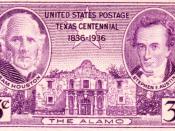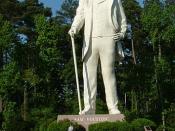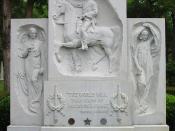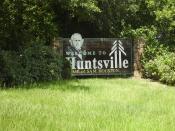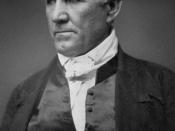Sam Houston, or ÃÂSix foot ThreeÃÂ, was born in Virginia on March 2, 1793 into a military family. Sam was a very hot-tempered and contradictory man; who played an important role in founding Texas. His father was a military captain that had served in the Revolutionary War and died when Sam Houston was only fourteen. His mother took him and his family of nine children to live in the eastern part of Tennessee. He ran away from home at the age of 15 where he lived with the Cherokee Indians, who gave Houston the chance to learn their customs as well as language. He also got his Indian name ÃÂCo-lon-nehÃÂ or ÃÂRavenÃÂ from his adopted father Oo-lo-tee-ka, chief of the Cherokees; earned strong ties with Indian people which helped preventing their rebels against the States.
His political involvement had rooted in his participation in the war of 1812 following his father route.
He served under Andrew Jackson in the campaign against the Creek Indians. Because of his extreme bravery and all the work he had done along with Jackson, he was able to get a position as an Indian agent to the Cherokee. Houston studied law and from 1818 to 1821 he was appointed several positions in the militia through the endorsement of Andrew Jackson. He ran for district attorney in Nashville, Tennessee, and was elected. In 1823 he was elected to be in the House of Representatives, in 1825 he was reelected and in 1827 he won the governorship.
Two years later rumors spread that he was becoming an alcoholic, and in 1829 he moved to the Indian lands of Arkansas. During this period of time he drank so much that he was known to the Cherokee as ÃÂBig Drunk.ÃÂ Regardless of his health state he still made trips to Washington, D.C. for business in Indian affairs which granted him Cherokee citizenship and tribal emissary.
In 1833 Houston moved to Texas and established a permanent residence. Because of the Texas revolution Houston was given the commander title in the Texas Army. When the Mexican general Santa Anna split his forces, Houston ordered to attack San Jacinto, this successful event gave Texas its most desired independence.
Since Texas was now the independent Lone Star republic it needed a president, and so Houston was chosen as its first president in 1836 and also in 1841. As President, Houston secured United States recognition of Texas and stabilized the finances of the republic. When Texas was declared a state in 1846, Houston was a United States Senator Continuing with his political career. He served from 1846 to 1860. He even had the idea of becoming the President of the United States but not seriously.
As politician he was supporter of the Mexican-American War and as a slave holder he was against the expansion of slavery into new territories. Houston views and beliefs made him unpopular with the Texas legislature. In 1859 he was elected once more as governor and since he was against secession he used the office to continue with this idea. He wanted Texas to be independent again, instead of becoming a confederate state. As a senator he made dramatic speeches against sectionalism. He took neither fully the side of the North or South but stood for benefit of the reunion. He declared himself in opposition to all the schemes of mad fanaticism at the North and mad ambition at the South. Houston also knew secession would lead to a Civil Was which the South could not win; therefore his stand was that keeping Texas from the separation to avoid the Civil War. He tried to defend the separation convention especially after Abraham Lincoln was elected President. In 1861 Texas voted to separate from the Union but Houston still held his position and refused to be and ally to the confederacy, as a result he was removed from office in 1861 ending his career in public service. When he refused to take the oath of loyalty to the newly formed Confederate States of America, the Texas convention removed him from office on March 16 and replaced him with Lieutenant Governor Edward Clark two days later. Reportedly, during these traumatic days President Lincoln twice offered Houston the use of federal troops to keep him in office and Texas in the Union, offers that Houston declined, again to avoid making Texas a scene of violence. Instead, the Raven-now sixty-eight years of age, weary, with a family of small children, and recognizing the inevitable-again chose exile. Houston retired to his home in Huntsville, Texas, where he died two years later in July of 1863. His last words were ÃÂMargaret! Margaret! Texas! Texas!ÃÂ General Sam Houston was a great man, his career spanned many years of turmoil. In memory of the ÃÂFather of Texas,ÃÂ the City of Houston and Fort Sam Houston were named after him.
Works sitedhttp://www.lsjunction.com/people /houston.htmhttp://www.pbs.org/weta/thewest/people/d_h/houston.htmSam Houston A Biography of the Father of Texas, John Hoyt Williams
